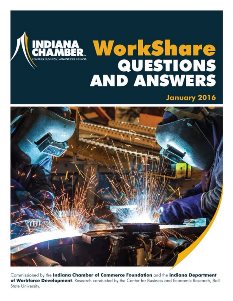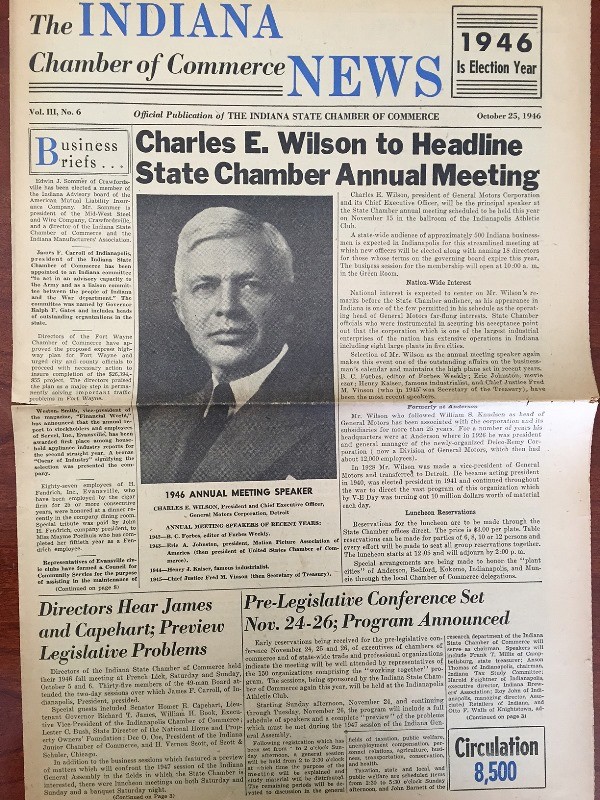 A new report released today by the Indiana Chamber of Commerce encourages the state to implement a voluntary work share program, labeling it “a clear stabilizer during a business cycle.” Work share would enable employees to stay on their job at reduced hours during tough economic times and collect partial unemployment compensation.
A new report released today by the Indiana Chamber of Commerce encourages the state to implement a voluntary work share program, labeling it “a clear stabilizer during a business cycle.” Work share would enable employees to stay on their job at reduced hours during tough economic times and collect partial unemployment compensation.
The policy – currently in place in more than half the states – has enjoyed support on both sides of the aisle the last few years, but has yet to make much progress in the state Legislature. The Indiana Chamber hopes this research, led by Michael Hicks of the Center for Business and Economic Research at Ball State University, will help get the ball rolling to pass work share legislation. The research was conducted at the request of the Indiana Chamber Foundation and the Indiana Department of Workforce Development.
The overriding conclusion reached by Hicks is that a “work share program would reduce business costs for participating firms by reducing search and hiring costs, and would stabilize families and communities.”
He continues, “We anticipate that unemployment and earnings will suffer less volatility associated with an economic downturn. This may have longer term impacts by reducing long-term unemployment and increasing consumer spending and growth in sales tax revenues over the short run.”
The report notes that the manufacturing sector, particularly the medium-sized manufacturing firms, would be the ones using the program the most. Indiana remains the most manufacturing intensive state in the country.
These findings confirm what advocates have been saying for several years, remarks Indiana Chamber President and CEO Kevin Brinegar.
“The benefits are real and significant. Work share allows employers to maintain a skilled, trained and stable workforce, while at the same time, employees keep their jobs and benefits instead of facing unemployment and further financial uncertainty.
“There is no negative impact on the state’s unemployment insurance fund,” he offers. “Instead of paying full benefits to a smaller group of recipients, a larger group of employees will receive reduced benefits.”
Here’s an example of how a work share program unfolds. Instead of laying off 10 workers due to decreased demand, a company could keep the full workforce in place but reduce the hours of 40 workers by 25%. The impacted employees would receive three-quarters of their normal salary, as well as be eligible for partial unemployment insurance benefits to supplement their reduced paycheck and keep full benefits.
Brinegar explains that “work share is generally a temporary solution used by employers for no more than six months during an economic slowdown.”
Tom Easterday, executive vice president for Subaru of Indiana Automotive in Lafayette, believes now – while the state’s economic picture is still bright – is the perfect time to enact a work share program.
“If we wait until there’s another economic downturn to take action, then it will be too late. Businesses across Indiana may already be impacted and jobs will be in jeopardy. Now is the time to prepare by implementing an efficient and effective workshare program, so it’s in place when needed.”
In the report, Hicks replays the unfortunate domino effect that took place in Kokomo in 2009 when two large automakers (GM and Fiat-Chrysler) suspended manufacturing for two months. While they could afford to continue employment due to their cash reserves, their large supply chain of smaller companies could not and were forced to lay off employees.
“Work share would have likely enabled some of these operations to continue at a slower pace. … The commercial benefits would have accrued primarily to these smaller manufacturing firms and would likely have stabilized the Kokomo economy significantly during this time.”
Brinegar reveals that early estimates place the annual costs to establish and operate a work share program in Indiana to be between $1 million and $1.5 million. He believes a nominal yearly surcharge of $10-$15 for those Hoosier businesses currently paying into the unemployment insurance fund would reach that amount and make the most sense.
“The amount is so small, especially for the possible benefits to an employer down the road,” he begins. “This group also received a per employee break recently when the state executed the early payoff of the federal unemployment insurance loan. This saved each business more than $126 per employee.”
Establishing a work share program in the state is one of the Indiana Chamber’s 2016 top legislative priorities.
The work share research document is available at www.indianachamber.com/labor.


 A new report released today by the Indiana Chamber of Commerce encourages the state to implement a voluntary work share program, labeling it “a clear stabilizer during a business cycle.” Work share would enable employees to stay on their job at reduced hours during tough economic times and collect partial unemployment compensation.
A new report released today by the Indiana Chamber of Commerce encourages the state to implement a voluntary work share program, labeling it “a clear stabilizer during a business cycle.” Work share would enable employees to stay on their job at reduced hours during tough economic times and collect partial unemployment compensation..jpg) Fortune magazine recently compiled a list of the 21 dumbest moments in the business world for 2009. Obviously, there are some automotive and stimulus-related entries, but it’s worth a look. For example, here’s one from the "workin’ hard or hardly workin’" category:
Fortune magazine recently compiled a list of the 21 dumbest moments in the business world for 2009. Obviously, there are some automotive and stimulus-related entries, but it’s worth a look. For example, here’s one from the "workin’ hard or hardly workin’" category: